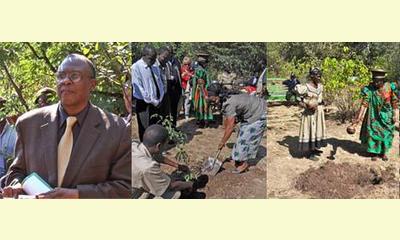|
|
A Call from Africa for Sustainable Tourism: the Lusaka Declaration
un articulo por Louis J. D'Amore
The Lusaka Declaration on Sustainable Tourism Development, Climate Change and Peace was unanimously adopted by the fifth African Conference of the International Institute for Peace through Tourism held at the Hotel InterContinental Lusaka, Zambia, from 15–20 May, 2011.

IIPT Board Chairman Timothy Marshall offering a prayer to begin Peace Park Re-dedication Ceremony; Hon. Catherine Namugala plants the first tree; and the Chieftess of the Toka Leya tribe waters peace tree.
click on photo to enlarge
More than 440 delegates from 36 countries participated, sharing their experiences, ideas, wisdom and commitments toward the theme: “Meeting the Challenges of Climate Change to Tourism in Africa and the Developing World”. The Conference showcased models of “best practice” in mitigating and addressing the anticipated impacts of climate change to tourism in Africa and the developing world.
In his keynote address, Zambia President Rupiah B. Banda stated that the tourism sector plays a very important role in the social and economic development of Africa and the developing world, and that tourism can only flourish when there is peace. He emphasized that tourism to Zambia, like many African and other developing countries, is nature-based, and therefore highly sensitive to climate change. He noted that Zambia is activating a national climate change response strategy with a number of projects and campaigns that are designed to control emissions; address the issues of desertification and deforestation; and provide climate resilience for agriculture.
Hon. Cathering Namugala, Zambia Minister of Tourism, Environment and Natural Resources emphasized the need to mobilize a global agenda in meeting the challenges of climate change, noting that Africa, with approximately 14 percent of the world’s population, contributes only 2.3 percent of Global Green House (GHG) Gases, yet is particularly vulnerable to its effects. She said that tourism has the potential to reduce poverty in developing countries but is already being adversely affected by climate change.
Zoltan Somogyi, Executive Director, World Tourism Organization (UNWTO), noted the importance of tourism to the socio-economic growth of African and other developing countries and urged that the continued and rapid advancement of tourism be green and sustainable. He called on the travel and tourism industry to address climate change by both reducing GHG emissions and taking measures for adaptation.
Geoffrey Lipman, Director, GreenEarth Travel, said it was time to unleash the potential of tourism with a paradigm shift that envisions tourism as a mainstream change agent embracing quadruple bottom-line reporting and "smart travel" that is carbon neutral, environmentally green, ethical and of high quality, regardless of low economy or luxurious travel.
Other featured speakers included ministers of tourism, senior representatives of U.N. agencies, regional organizations, tourism boards, non-governmental organizations, the media and leading academics.
For further details, see www.iipt.org.
(The Lusaka Declaration is reprinted here in the discussionboard - see righthand column of this page)
|








|
DISCUSSION
No hay pregunta ligada a este article.
* * * * *
Comentario más reciente:
(This is continued from the article, A Call from Africa for Sustainable Tourism: the Lusaka Declaration.
LUSAKA DECLARATION ON SUSTAINABLE TOURISM DEVELOPMENT, CLIMATE CHANGE AND PEACE
We, the more than 440 participants from 36 countries of Africa, Asia, Europe, North America and the Caribbean, assembling for the 5th IIPT African Conference: “Meeting the Challenges of Climate Change to Tourism in Africa and the Developing World, ” at the Hotel InterContinental, Lusaka, Zambia, 15-20 May, 2011, in support of the U.N. Millennium Development Goals –
Considering:
World population has increased from 1.6 billion in 1900 to 6.0 in 2000 and will reach 9.0 billion by 2050, with 90 percent of this growth in developing countries.
Growth in population, global consumption and the global economy has stressed the Earth’s ecological systems and depleted much of the world’s natural resources.
It now takes the Earth one year and six months to regenerate what our world population consumes in one year, resulting in collapsing fisheries, depleting forests, species extinction, water shortages and crop failures – all with disproportionate impacts on the poor regions of the world.
U.N. Secretary General Ban Ki-moon has stated, “Climate change is the pre-eminent geopolitical and economic issue of the 21st century. It rewrites the global equation for development, peace and prosperity. ”
Acknowledging:
The year 2010 ranked as the warmest on record, together with 1998 and 2005; the ten warmest years on record have all occurred since 1998; Arctic sea-ice cover in December 2010
was the lowest on record; and a growing number of extreme weather events have occurred in regions throughout the world in the past two years. . ... continuación.

|
|









